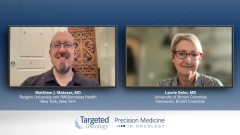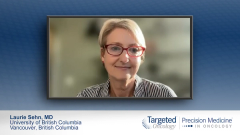
Bispecific Antibodies in Relapsed/Refractory Follicular Lymphoma: AE Management
Experts Matthew Matasar, MD and Laurie Sehn, MD, nuance the adverse event profiles of bispecific antibody therapies and consider how these will help inform treatment decisionmaking.
Episodes in this series

Transcript:
Matthew J. Matasar, MD: The point you make is a good one about sort of looking at the nuance of how these drugs are being developed. And there are differences between and among these agents, both in terms of, is it finite therapy, such as mosunetuzumab and glofitamab, or extended therapy, such as epcoritamab and odronextamab treatment until progression or intolerance with those. Some are given intravenously and some subcutaneously. But for me, one of the most important differences is the differences in the toxicity profile of these agents, particularly in the context of follicular lymphoma where toxicity considerations may become even more important than they might be in the measure of aggressive lymphomas. I’d love to hear your take on the toxicity of mosunetuzumab and how you’ve experienced that in using this in the ongoing trials.
Laurie Sehn, MD: The bispecific antibodies targeting CD20 and CD3 come with a unique set of toxicities that will present a learning curve for clinicians who haven’t used them. We’ll all need to develop strategies to anticipate these toxicities and to manage them. I suspect as these drugs roll out and gain approval that there’ll be clear-cut management guidelines for each of the individual drugs based on what was seen in the clinical trials, guiding clinicians as to how to manage the initial introduction of the drugs. So the toxicities I’m referring to are [from] cytokine release syndrome [CRS]…[which is] probably the main unique toxicity that will need to be taken into account.
The important thing to realize is many of us started to understand what cytokine release syndrome was based on our experience from CAR [chimeric antigen receptor] T-cell therapy, where it was similarly a relevant toxicity. I think there’s been a big learning curve in the management of CAR T-cell therapy patients to better understand the management of CRS in the bispecific antibody setting, but for the most part, across the board in clinical trials with the bispecific agents, the CRS that we’re seeing is largely low grade in nature; grade 1 or 2, and it typically will occur in the first cycle.
To ameliorate that and to reduce the risk of very pronounced cytokine release syndrome, most of the drugs have introduced step-up dosing in the first cycle. Patients get many doses in the first couple of weeks. An initial loading dose in the phase 1 component of these trials has shown to lower the risk of cytokine release syndrome and lower the grade of cytokine release syndrome. In some of these trials, some patients have needed steroids or tocilizumab. In some cases, the steroids are given preemptively. But, in general, it is a fairly manageable toxicity with a very low likelihood of patients developing high-grade toxicity. However, this is a toxicity that clinicians will need to anticipate, need to manage, either preemptively or reactively, and also will need to have strategies to take care of the rarer patients who do develop more significant CRS.
I think, ultimately, we expect that most of these agents will come out as outpatient treatment. So they’ve fine-tuned the scheduling in these early trials, particularly for the subcutaneous agents that probably has reduced the risk of very significant CRS, allowing them to be given in the outpatient setting. But I think [there will] be a learning curve. We’ll all have to develop management strategies and make sure that we can deliver them safely. But keep in mind this is a cycle 1 problem. Beyond generally cycle 1 and rarely cycle 2, the risk of CRS is virtually nonexistent, and patients tolerate it very well after that.
The other toxicity we’ve learned about from CAR T-cell therapy has been the neurologic toxicities that we can see with immunotherapies—often referred to as ICANs [immune effector cell-associated neurotoxicity syndrome] when we refer to it in a CAR T-cell setting. I would say that that risk with bispecifics is exceedingly low. So while some element of neurologic toxicity has been reported, I think that based on how neurotoxicity is captured in clinical trials, or [potentially] attributing some neurotoxicity or other complications to…the drug, in my experience, it has been a really low risk with bispecifics, and I think it is not going to present a huge impediment for outpatient management. Then the other main toxicity that we see is cytopenias, which is quite comparable, but less than we see with chemotherapies, and I think most clinicians are comfortable managing cytopenias.
Matthew J. Matasar, MD: For me, it really comes down to CRS management. It is, as you’ve said, particularly with mosunetuzumab, relatively low rates and relatively low grade, but grade 2 CRS is still something that requires medical intervention. This is being developed as a fully outpatient therapy, which is key to being able to deploy it, to offer broader access, and in order to [educate] oncologists, nurses, emergency departments, and hospitalists on how to recognize and diagnose CRS. [It’s also educating about] how to distinguish it from infusion-related reactions, and when and how to intervene. So there’s a lot of work that’s going to have to underlie the clinical rollout of these agents to support their safe administration and broad context.
Laurie Sehn, MD: Absolutely. I think you make a really important point that it’s not just education among the oncologists. These will become mainstream drugs. CAR T-cell therapy is still relegated to specialty centers where many patients are treated as inpatients, and these toxicities have rolled out while they’re under the care of a specialist. Whereas, I think we’ll inevitably see bispecifics roll out into the community, and many other complications will make their way into local emergency departments. It’ll be a big learning curve across the medical environment that needs to take place to make sure these patients are managed safely. But I’m quite confident that this is doable with these agents based on the degree of toxicities we’re seeing. Most of the toxicities can be quite predictable in terms of timing, and with the right strategies in place, I think that these will be amendable to outpatient care.
Matthew J. Matasar, MD: Again, there are differences among the bispecific antibodies, where mosunetuzumab seems to have the lowest rates of cytokine release and other severe adverse events. Very low rate to treatment interruption, discontinuation in the pivotal study. Whereas glofitamab/epcoritamab may be more potent, particularly in the treatment of aggressive B-cell lymphomas, but associated at higher rates of cytokine release syndrome of grade 2 or greater. It may be more challenging to administer in general practice.
Laurie Sehn, MD: It’s hard sometimes to compare across these trials…but I do agree in general. For example, with glofitamab, which has been tested in both follicular lymphoma and aggressive B-cell lymphomas, there is a slightly higher risk of CRS. So, whether it’s a more indolent [disease]—like follicular lymphoma, where the data looks very good for efficacy with alternative agents like mosunetuzumab—whether or not that will become the preferred agent because of its maybe more favorable toxicity profile, I think that we will see some selection of the bispecifics geared toward individual patients based on this comparative toxicity that we, at least at the present, perceive. But I think we don’t want to make too much in the way of overstatements because at this point it’s still the separate trials with separate groups of patients and it’s probably hard to really make the comparison.
Matthew J. Matasar, MD: That’s a very good point.
Transcript edited for clarity.





















